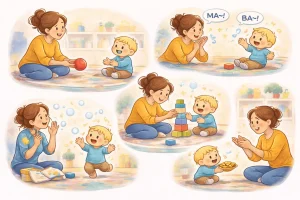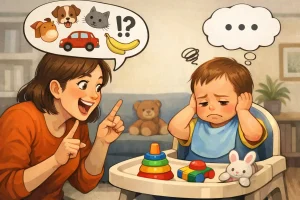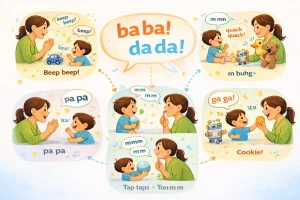My 5-Year-Old Still Struggles With Sentences — Is It Normal?
Last Updated: September 8, 2025
Have you noticed that your 5-year-old is still not speaking in full sentences? Maybe your child talks in short phrases like “want juice” or “go park” but struggles to put longer ideas together. As a parent, it’s natural to wonder: “Is this normal, or is it a sign of a speech or language delay?”
By age five, most children are expected to use complete sentences, tell simple stories, and use correct pronouns and verb tenses. But every child develops at their own pace, and while some variation is perfectly normal, persistent struggles with sentence formation can be a red flag for language delay.
Free Speech Help for Kids
Concerned about speech delays? Book a free consultation with our expert speech therapist and get guidance tailored to your child’s needs.
What Speech and Language Milestones Should a 5-Year-Old Reach?
By the age of five, most children have made big strides in their communication skills. They move from using short phrases to creating more complete thoughts. These 5-year-old speech development milestones give parents a clear picture of what to expect and help identify if there might be an expressive language delay in 5-year-olds.
At this stage, children are learning to combine vocabulary, grammar, and syntax to express themselves more clearly. Strong sentence formation skills are important not just for conversations but also for school readiness and early literacy.
Here are the common milestones most children reach by age five:
- Speak in full sentences of 4–6 words or longer.
- Use correct pronouns like he, she, they, and me.
- Apply past tense verbs (“I played,” “She went”) and begin experimenting with future tense.
- Retell simple stories with a beginning, middle, and end.
- Ask and answer wh-questions (who, what, where, when, why).
- Expand vocabulary rapidly, using descriptive words to add detail.
- Show narrative skills, like explaining daily events in order.
When these skills begin to emerge, children gain more confidence in sharing their thoughts and connecting with others. Delays in areas like pronoun use, verb tense, or storytelling may point to an expressive language delay that needs extra support.
By keeping an eye on these milestones, parents can better understand whether their child is on track, or whether it’s time to explore home strategies or professional guidance.
Also read: What is the Relation between Communication, Speech and Language? | Speech and Language Therapy
Is It Normal for a 5-Year-Old to Struggle With Sentences?
Many parents ask, “Is it normal if my 5-year-old still struggles with sentences?” The short answer is: sometimes yes, sometimes no. Every child’s journey in language is unique. Some children hit milestones early, while others take a little more time to catch up.
If your 5-year-old is not forming complete sentences all the time, it doesn’t always mean something is wrong. Some children may speak clearly in familiar settings but use shorter phrases when they feel shy, tired, or overwhelmed. Occasional mistakes in grammar or skipping words is also typical at this age. For example, a child might say “Him go park” instead of “He went to the park.” This shows they are still learning how to master grammar and syntax.
However, persistent difficulties—like a five year old not forming sentences beyond two or three words, struggling to tell simple stories, or rarely using pronouns—can be a red flag for a language delay. These signs may point to challenges with expressive language, and early support from a speech-language pathologist can make a big difference.
It’s also important to consider bilingual 5-year-old language development. Children growing up with two languages might mix grammar rules or switch between languages in the same sentence. This is usually a normal part of bilingual development and not always a sign of delay. In fact, bilingual children often catch up and may show strong language flexibility later on. The key is to look at whether they can form sentences and communicate clearly in at least one of their languages.
Know more: Why Isn’t My 4-Year-Old Speaking in Full Sentences Yet?
Signs of a Possible Language Delay at Age 5
By the time children turn five, their communication skills are usually well on their way. They can hold conversations, tell short stories, and use grammar more accurately. But if your child is still struggling, it may point to a deeper concern. Parents often search for the red flags for language delay at age 5 to know when it’s time to take action.
One common condition is developmental language disorder (DLD), where children have trouble learning and using language without any hearing loss or other medical reasons. Another is an expressive language disorder, where kids understand what others say but can’t express their own thoughts clearly. Both can affect school readiness and social skills if not addressed early.
Here are some signs that may indicate a possible delay:
- Speaking mostly in short phrases rather than full sentences.
- Frequently missing pronouns (saying “Me want” instead of “I want”).
- Struggling with poor grammar or incorrect verb tenses.
- Having difficulty telling stories or sequencing events in order.
- Showing poor sentence structure in kids compared to peers.
- Noticeable grammar delay, with frequent mistakes for their age.
- A limited vocabulary at age 5, making it hard to describe ideas or feelings.
These symptoms don’t always mean a child has a disorder, but they are important signals for parents to watch. If several of these challenges are present and consistent, it’s worth discussing them with a speech-language pathologist.
Causes of Sentence Struggles in 5-Year-Olds
When a child has difficulty forming full sentences, parents often wonder why. Understanding the possible causes can help you decide whether it’s a temporary phase or something that needs extra support. At this age, it’s important to distinguish between articulation vs language delay at age 5 and between receptive vs expressive language challenges.
- Articulation delay means a child has trouble pronouncing sounds correctly. For example, saying “tat” instead of “cat.” These children may know what they want to say, but unclear sounds can make their sentences hard to understand.
- Language delay, on the other hand, is about difficulty putting words and grammar together. Here, the issue isn’t pronunciation, but the ability to form complete thoughts in sentences.
Another important distinction is receptive vs expressive language in a 5-year-old:
- Receptive language is how well a child understands what is said to them.
- Expressive language is how well they can use words, grammar, and sentences to share their own ideas.
Some children understand everything but can’t express it clearly, while others struggle with both.
Common factors that may affect sentence development:
- Hearing issues: Even mild hearing loss from frequent ear infections can make it harder to pick up grammar, sounds, and new words.
- Bilingualism: A bilingual 5-year-old may mix words or grammar from two languages. This is usually a normal stage in bilingual language development, not always a true delay.
- Developmental delays: Conditions like autism spectrum disorder, developmental language disorder (DLD), or intellectual disabilities can affect sentence formation.
- Environmental factors: Limited exposure to conversation, storybooks, or interactive play may slow down vocabulary and sentence growth.
In most cases, sentence struggles have more than one contributing factor. Identifying whether the challenge is articulation, language, or both helps parents and speech-language pathologists choose the right strategies for support.
When to Worry and Seek Professional Help
It’s natural for parents to wonder, “When should I worry about speech delay at 5?” While some children catch up on their own, others may need extra support to develop stronger communication skills. Knowing when to see a speech therapist for sentence issues can make all the difference in preparing your child for school and everyday life.
When to Worry
You may want to seek professional guidance if your child:
- Rarely speaks in complete sentences compared to peers.
- Struggles to retell simple stories or follow a conversation.
- Uses incorrect grammar consistently (for example, “Him go” instead of “He went”).
- Has difficulty being understood by people outside the family.
- Shows frustration when trying to express ideas.
These signs suggest that waiting it out may not be the best option, especially as kindergarten readiness depends heavily on language and sentence formation skills.
The Role of a Speech-Language Pathologist (SLP)
An SLP (speech-language pathologist) is trained to evaluate and treat communication delays. During an evaluation, they may:
- Talk with you about your child’s developmental history.
- Use screening tools and checklists to measure language, grammar, and vocabulary.
- Assess both expressive language (how your child speaks) and receptive language (how your child understands).
- Observe your child in conversation, storytelling, or play-based activities.
Based on these results, the SLP will create a personalized therapy plan. Early support, often called early intervention, has been shown to improve outcomes and boost confidence in children who struggle with speech.
Why Early Action Matters
The earlier sentence struggles are identified and addressed, the easier it is for children to catch up. With professional help, your child can strengthen grammar, expand vocabulary, and improve their ability to communicate effectively before school challenges become overwhelming.
In short, trust your instincts—if you feel your child is falling behind, reaching out for an evaluation is a proactive step, not a cause for alarm.
How to Help Your 5-Year-Old Build Longer Sentences at Home
If your child is still using short phrases, don’t worry—there are many simple ways to encourage growth. With fun, everyday strategies, parents can turn regular conversations into powerful learning opportunities. The goal is to gently guide your child from two- or three-word phrases into more complete thoughts. These activities to improve sentence formation for 5-year-olds are easy to do at home and require little preparation.
1. Try the Model-Expand Technique
When your child says something simple like “want juice,” you can expand it into a fuller sentence: “You want juice. You want cold juice in a cup.” This technique shows them how to naturally add words without pressure. It’s one of the most effective home speech therapy exercises for sentence building.
2. Encourage Storytelling Practice
Daily storytelling practice for 5-year-olds helps build narrative skills. After school, ask your child to share what happened first, next, and last. Use picture books or even family photos to spark conversation. This develops both grammar and sequencing, which are key parts of sentence growth.
Know more: Boost Kids Storytelling Skills: Engage and Educate at Home
3. Use Picture Cues
Pictures can help children link ideas into sentences. Show a picture of a child eating ice cream and ask, “What is happening?” Guide your child to say, “The boy is eating ice cream” instead of just “ice cream.” Picture cues reduce pressure and give clear visual support.
4. Play and Talk Together
Play-based learning is one of the most natural ways to practice language. During block play or pretend cooking, encourage your child to describe what they are doing: “I am building a tower,” “I am stirring soup.” These simple sentence starters for kids—I want, I see, I am—help expand everyday conversations into richer speech.
5. Celebrate Efforts, Not Just Accuracy
Praise every attempt at longer sentences, even if grammar isn’t perfect. Confidence is just as important as correctness, and small wins add up quickly.
With consistency, these home activities can make a big difference. The more opportunities children have to hear, practice, and play with language, the stronger their sentence formation skills will become.
Speech Therapy Options for 5-Year-Olds
If your child is still struggling with sentences, professional support can make a big difference. Speech therapy for 5-year-olds is designed to strengthen grammar, vocabulary, and sentence formation while building confidence in communication. Therapy doesn’t look like a classroom lesson—it’s engaging, fun, and tailored to each child’s needs.
What Happens in Speech Therapy?
A speech-language pathologist (SLP) uses structured yet playful methods to help children communicate better. Sessions often include:
- Storytelling games to improve sequencing and narrative skills.
- Role-play and pretend play to encourage longer conversations.
- Picture cards and visual prompts to expand vocabulary and sentence length.
- Songs, rhymes, and movement activities that link language with rhythm and memory.
These methods are essentially play-based language activities for 5-year-olds, which make learning enjoyable while targeting sentence growth.
Online Tools and At-Home Support
In today’s digital age, parents can also access therapy support at home. Apps like BASICS, designed for speech and language development, guide families with interactive exercises, vocabulary practice, and sentence-building games. These resources complement in-person therapy and give children extra daily practice in a fun format.
The Role of Parents
Parents are key partners in therapy. By practicing strategies at home—such as expanding on short phrases, reading books together, and encouraging storytelling—you reinforce what your child learns in sessions. Consistency between therapy and home practice helps children progress faster.
Speech therapy isn’t just about correcting mistakes—it’s about giving children the tools to express themselves fully. With early support, children can overcome sentence struggles and enter school with stronger language skills and more self-confidence.
Conclusion
Every child develops speech at their own pace, and small mistakes at age five are normal. But if your child still struggles with full sentences, don’t ignore it. The benefits of early intervention are huge—it helps children gain skills faster, build confidence, and get ready for school. With the right speech and language support for kids, progress is possible. Try simple home activities, encourage storytelling, and explore therapy tools. If needed, consult a speech-language pathologist (SLP). Early action gives your child the best chance to become a clear, confident communicator.
Frequently Asked Questions:
1. Is it normal if my 5-year-old still struggles with sentences?
Yes, some variation is normal, but if your child only uses short phrases or avoids full sentences often, it may be a sign of a language delay.
2. When should a child start speaking in full sentences?
Most children can speak in complete 4–6 word sentences by age five, using pronouns, verb tenses, and simple storytelling.
3. Why is my 5-year-old not forming complete sentences?
This can happen due to expressive language delay, hearing problems, developmental conditions, or limited practice with talking and storytelling.
4. What are the red flags for language delay at age 5?
Warning signs include short phrases, poor grammar, missing pronouns, limited vocabulary, or trouble retelling simple stories.
5. How can I help my 5-year-old build longer sentences at home?
You can use the model-expand technique, storytelling practice, picture cues, and play-based activities to encourage fuller speech.
6. What is the difference between articulation and language delay at age 5?
Articulation delay is about unclear sounds (like “tat” for “cat”), while language delay is about difficulty building complete sentences.
7. Do bilingual 5-year-olds take longer to form sentences?
Sometimes. Mixing languages or grammar rules is normal in bilingual 5-year-old language development, but they should still form sentences in at least one language.
8. When should I worry about speech delay at 5?
If your child can’t speak in full sentences, is hard to understand, or avoids talking, it’s best to consult a speech-language pathologist.
9. What kind of speech therapy is best for 5-year-olds?
Speech therapy for 5-year-olds often includes play-based activities, storytelling, role-play, and vocabulary games to improve sentence skills.
10. What are the benefits of early intervention in speech delays?
Early intervention helps kids learn faster, gain confidence, and get the right speech and language support for kids before school challenges begin.
About the Author:
Shravanaveena Gajula
M.Sc ., Speech and Language Pathology (5+ years of experience)
Shravanaveena Gajula is a dedicated Audiologist and Speech-Language Pathologist with a BASLP and an M.Sc in Speech and Language Pathology. With experience spanning multiple settings, including Wellness Hub and Ashray Akruti, Veena specializes in a wide range of disorders from developmental issues in children to speech and language assessments in adults. Her expertise includes parent counseling, managing speech sound and fluency disorders, and creating individualized therapy programs. Veena is also PROMPT certified and an author of several insightful blogs on speech and language pathology, aiming to educate and assist caregivers in supporting their loved ones.
Book your Free Consultation Today
Parent/Caregiver Info:
Client’s Details:
* Error Message









